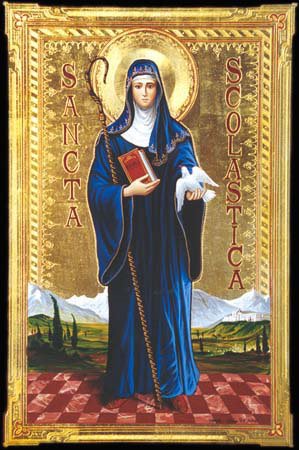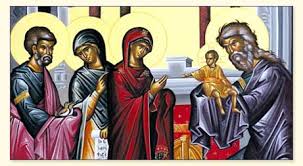
Saints have families; fathers, mothers, sisters, brothers. Many times saints come from holy families. The same is true for today's saint, Saint Scholastica. Her twin brother was St. Benedict of Nursia, the founder of the Benedictine religious order. To have such a famous brother might be a burden for some, but St. Scholastica was famous in her own right as a founder of a religious order of women and thus she is the patron saint of nuns.
St. Scholastica's community was five milesa away from Monte Cassino, the famous first monastery of the Benedictines that St. Benedict founded. They would meet once a year to pray and talk with one another about spiritual matters. The last time that they met, St. Scholastica requested her brother to stay longer, but he wanted to get back to his monastery. She then prayed for a miracle to allow her to be with her brother and a thunderstorm broke out, keeping him there. He was troubled and said to her, "'God forgive you, what have you done?' She answered him, 'I desired you to stay, and you would not hear me; I have desired it of our good Lord, and he has granted my petition.'" Three days later she died and St. Benedict saw her soul ascend to heaven in the form of a dove.
Our families are where we first learn of God and his love for us. We help each other to grow closer to God by being loving fathers, mothers, sisters, brothers, and so forth. May all that we do for our families be done according to God's will with God's love, as St. Scholastica did and would have us do.

February 2 is the feast of the sacred groundhog, whose sacred home is in Punxsutawney, Pennsylvania. Every year on this day we celebrate the possibility of the coming of glorious spring or the continuation of the gloomy winter for six more weeks. NOT LIKELY! Catholics do not celebrate the winter musings of a large rodent. We celebrate the Presentation of the Lord in the Temple. Mary and Joseph came to Jerusalem for the ritual purification of Mary and for the presentation of Jesus, both in accordance with the Jewish Law.
But more than that, it is at this event that we have two testimonies to Jesus' future sacrifice. Simeon and Anna were witnesses to the promise of God's salvation and rejoiced: Simeon, who was promised that he would not see death until he saw the Lord, through his song, "Now, Master, you may let your servant go in peace, according to your word, for my eyes have seen your salvation, which you have prepared in sight of all the peoples, a light for revelation to the Gentiles, and glory for your people Israel" (Lk. 2:29-32); and the prophetess Anna, who "gave thanks to God and spoke about the child to all who were awaiting the redemption of Jerusalem" (Lk. 2:38).
The "glorious spring" that we await is the celebration of Easter; the "gloomy winter" we joyfully endure is the season of Lent, which prepares us for Easter. There is no downside to either event. It is not about the vision of the groundhog which guides us, but the vision of Simeon and Anna, who, in their joy, prepares us for the joy of the redemption of all humanity. Groundhog--no, Jesus--Yes.
We know of Sts. Timothy and Titus from Paul's letters of the same name. We know that they were companions of Paul on his missionary journeys. We call them bishops because Paul appointed them to be in charge of communities of believers in Ephesus and Crete respectively as overseers, to maintain and teach the faith, to worship and celebrate the sacraments, and to guide the people in the right way of living. Because Paul appointed them, they were able to continue to spread the faith. As bishops they were successors to the first apostles.
One reason we believe what we believe is because of apostolic succession, bishops succeeding each other all the way back to the first twelve apostles. Our bishops maintain the same role in the Church as did those first twelve. They are called to witness to the truth of the love of Jesus for us, to spread the Good News of salvation to all the world, to serve the people under their care.
Paul writes in his second letter to Timothy: "I remind you to stir into flame the gift of God that you have...." In his letter to Titus, Paul writes: "I left you in Crete so that you might set right what remains to be done ...." Timothy and Titus had the privilege of knowing Paul, who knew Jesus. Our bishops knew the bishops who ordained them and so on. We have the surety, through the apostolic succession, that our bishops are guiding us to God.
